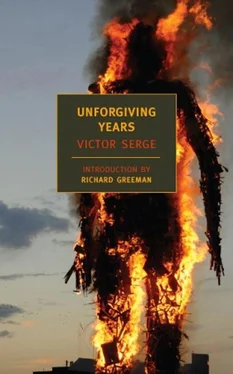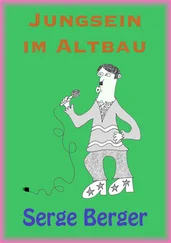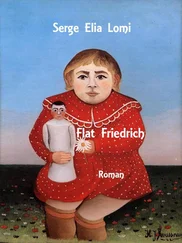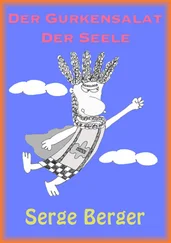“Talk, what for, Dachenka?”
“Nobody,” Bruno Battisti said placidly. “We are alone. Like stones being stones. The thing is to wait.”
“What do stones wait for?” Daria thought.
“You’re bored,” said Bruno. “Would you like to play a game of chess? Harris is probably coming over tomorrow.”
* * *
Harris came over two or three times a week. This young American lived in a solitude even greater and more parched than their own, a good hour’s trek from the plantation, in the heart of the forest, where he occupied a big, tumbledown adobe dwelling hemmed in by ferocious, resplendent agaves. “As far away from two-legged creatures as I can get,” he’d say. Harris was generally a man of few words, but when in a philosophical mood he might explain: “Man, attempting to change his fate, has come up with only one liberating invention: scotch whiskey!” This gave rise to commentaries verging on the profound, allowing one to recall that the ancient barbarian civilizations, in this land so close to the present, made their liquor by fermenting the milk of the agave plant. “Scotch is better,” Harris declared, “but if that’s the only proof of the white man’s superiority, it’s a feeble one…” Harris was a steady drinker who never lost his self-control. But until he was loaded with “the right dose of gunpowder,” all you saw of him was a big brute with ruddy-brown hair — a rather mournful, listless lout who yawned a lot and sometimes bit his nails. Having been a sailor, he nursed a grudge against the sea, like an old betrayed lover. “A big wet desert, right? The most inhuman place in the world, along with factories. And every ship’s a floating prison or a floating cathouse. Or else a floating fortress, packed with poor dumb suckers. And not easy to sink!” Their being hard to sink seemed to have left him with malevolent regrets. He had fought “honorably” in the Pacific Islands, but whether he had come home with medals or a warrant for his arrest, he did not say. “The sea and the war: two big piles of shit…” You could easily imagine him, with his hard, fleshy face, his round boxer’s shoulders, his cynical expression and clouded eyes, in some mobsters’ dive, as ruthless as the worst of them and as snappy a dresser, with that slightly louche elegance; then later dressed like them in a striped suit breaking up rocks on a chain gang. All purely imaginary, of course, since flipping a coin would be the best way to decide whether his past was ordinary or adventurous… He read nothing but hard-boiled thrillers, the kind with lots of killing, where at the end they’re going to hang the seductive heroine who for three hundred pages seemed to be the most mysterious, the most desirable, the most tantalizing young woman in distress… But on page 287, when her wickedness has emerged beyond any reasonable doubt, the detective gives in and kisses her on the lips, gently takes her hands — and brings out the handcuffs… She’s been had, the vixen, and so have you, dear reader, since only then did you understand that the roots of crime lay here, in this melting gaze, this soft disarming flesh… Harris reveled at the idea of the pleasure he would have kicking in the teeth of that detective or of the author, that dirty “son of a bitch!” [32] 1. Phrase appears in English in the original text.
When he was finished reading, Harris would toss the book onto the little heap of paperbacks, each offering a detective puzzle to be deciphered for twenty-five cents. This library gathered dust in a corner; the hens pecked around it sometimes, attracted by — what? What could these birds find to peck at in or under all these nasty stories? Harris poured himself a shot of tequila. Harris called out: “Monica! Mon-i-ca!”
Monica showed herself in the doorway, framed between the radiant space without and the shadows within; a beautiful tall girl with a long pleated skirt down to her toes, hair piled on the back of her neck, a Polynesian face with open, level brown eyes. She was scrubbing an earthenware vessel with sand. “¿ Qué quieres ? What do you want?” In Spanish, the verb querer means both to want and to love, with no possible confusion between them, so that a man might as easily answer “ Te quiero ” as “Bring me a glass of water.” But Harris often answered nothing at all and simply gazed pleasurably at her, thinking something wordless like: “You’re an adorable creature, Monica, but my god, what real difference is there between you and the jungle flowers who open their crimson vulvas?” In Monica’s eyes he was ugly, as the male ought to be: ugly, brawny, serious, never too drunk, and never violent toward her, with never more than a passing glance for the other girls from the few hovels scattered around here… And rich, because there was never a shortage of maize. To ensure his lasting love, Monica spiked his tequila with pinches of a white powder that was a specialty of Doña Luz. It seemed to do the trick! Harris undressed her when the heat went down (it didn’t take long, she wore only a loose blouse, a loose skirt) and made a charcoal sketch which he soon crumpled and threw into the corner of the “son-of-a-bitch’s library.” Then he was upon her in two short bounds, the naked amber girl as she stood against a slit of window with the mountainside still blazing beyond. He was more magnificently ugly then than at any other time, this laughing, furious white man with the muzzle of a sorrowful beast. Almost all men were like that, according to the girls of San Blas, but none of the local men were acquainted with the drawing ritual, which must therefore have a hidden meaning. Was it an appeal for vigor, for sweetness? For joy? Monica questioned Doña Luz, and she, from the height of her sixty years of experience, handed down an incomprehensible but favorable judgment: “Your man is an artista , my child.” “What’s an artista , Doña Luz, madrecita , little mother?” “I know many secrets, child, but not that one. I can’t be expected to know everything. An artista is an unbeliever, but he is not usually a bad man. Better than most gringos, God have mercy!” Harris had a way of kissing and caressing that the men around here don’t know; it must be another custom of his country, an easy thing to submit to and not a sin to emulate, for you see, Virgin of Wonders, Holy Queen of Heaven, Our Lady of the Lake, you see that he is my man and that I love him! He possessed her on the hard mat with a long, leisurely passion. While they were tangled up in lovemaking, a distracted hen might wander in, or Nacho, the gleaming purple turkey-cock, whose hard, coral-ringed eye made Monica uncomfortable. Rising above the fire of blessed fever within her, she would call out, “Nacho! Nacho! Shame on you! Scram!” The wicked old bird would mince off with the utmost dignity, swinging his purple crop as though he didn’t understand, but he’d be back, the sneak… And when Monica reappeared in the yard he would spread his cartwheel of a tail at her, lifting his feet in a little jig… “Yes, Nacho, you’re beautiful, you are…” she crooned, still smiling at the sweet giddiness inside her. Harris had paid the price of a fine horse to Monica’s parents; he had laid on a fiesta for the whole community, a memorable event enlivened by ten bottles of pulque and two hundred firecrackers; the padre of San Blas, Don Maclovio himself, had been good enough to attend.
Harris was no artist, if truth be told, for all that most artists are frauds. He drew like a schoolboy, for the enjoyment of tracing the shape of a woman or the lines of a landscape; for the humiliation of failure, for the pleasure of destroying what he had made and of making it expressly to destroy. The earth behaves no differently: it makes plants and sentient beings and destroys them, only to start all over again, right? He drew when he was slightly drunk and destroyed when he was sober, pained by the limits of his own lucidity. He hunted hares, quail, wild ducks; if luck was on his side he might kill an iguana, that big blunt-nosed lizard with a sumptuously green skin, which Monica turned into a feast, dressed with hot spices. “In my country,” Harris told her, “there are people who never saw a hare take off from under the rocks, can you understand that?” “Poor people!” said Monica, eyes shining with pleasure because he was talking to her. “They buy their hares ready-skinned in big stores which sell hundreds at a time…” “Hundreds!” Monica repeated, incredulous. “Stores as big as that?” “And the people are bastards, most of them!” Harris concluded, in opaque laughter.
Читать дальше












